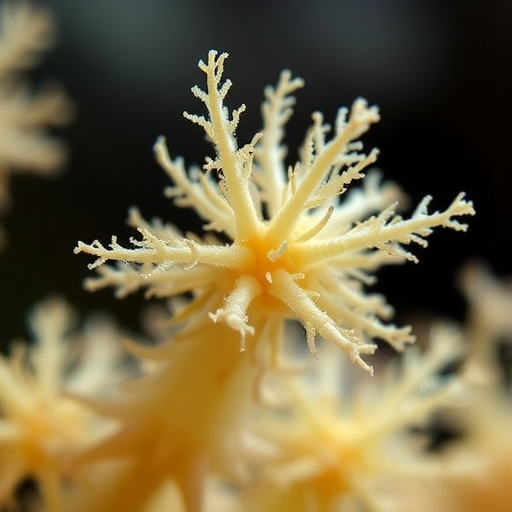In an extraordinary advancement in microbial taxonomy, researchers have unveiled a novel bacterium, Sedimentitalea sediminis sp. nov., isolated from marine sediment. This discovery, detailed in a groundbreaking study, underscores the complexity and diversity of microbial life present in sedimentary environments. The new strain was isolated from a rich marine habitat, revealing the potential for uncovering further unknown microbial species that could shed light on the evolutionary processes that have shaped our planet’s biodiversity.
Sedimentitalea sediminis represents a significant addition to the growing family of sediment-associated microbes. The study highlights the importance of marine ecosystems in contributing to our understanding of microbial evolution. As marine sediments provide a unique environment, containing various organic and inorganic compounds, they are incredibly hospitable to a myriad of microbial inhabitants. The isolation of this bacterium emphasizes the potential for discovering more functional and phylogenetically distinct microorganisms within these substrates.
The characterization of Sedimentitalea sediminis involved a multi-faceted approach, integrating both phenotypic and genotypic analyses. This meticulous work showcases how researchers use various methods, including 16S rRNA gene sequencing, to accurately classify and identify microorganisms. The phylogenetic analysis indicated that Sedimentitalea sediminis belongs to a previously uncharacterized branch of the bacterial tree of life, suggesting that there are vast expanses of microbial diversity that remain unexplored.
One of the notable characteristics of Sedimentitalea sediminis is its remarkable adaptability to the fluctuating parameters of its marine sediment environment. The researchers noted that the bacterium exhibits survival mechanisms that allow it to thrive in conditions where many organisms would struggle. Its metabolic flexibility opens the door to potentially novel biochemical pathways, which could be harnessed for biotechnological applications, including bioremediation and bioengineering.
Furthermore, the study also emphasizes the ecological significance of Sedimentitalea sediminis. Bacteria play crucial roles in nutrient cycling and organic matter decomposition, processes integral to sustaining marine ecosystems. This newly identified species can contribute to these vital functions, thereby enhancing our understanding of sediment biogeochemistry. The implications of such discoveries extend beyond mere classification; they provide insights into ecosystem health and resilience.
Research on marine sediments has historically been limited, leading to an under-appreciation of the diversity of microbial life in these regions. This study serves as a clarion call for the scientific community to broaden its focus on these environments. Given that marine sediments account for a substantial portion of the Earth’s surface, exploring them could yield not only new species but also critical data on their roles in global biogeochemical cycles.
Using advanced cultivation techniques, the researchers isolated Sedimentitalea sediminis from samples collected in a marine sediment environment. This process highlighted the challenges associated with culturing previously unculturable microorganisms, which form the vast majority of microbial communities in natural environments. By refining cultivation strategies and applying them to sediment samples, the team has successfully enriched our microbial catalog, providing a reference point for future studies.
The researchers did not stop at isolation; they went further to assess the physiological and biochemical properties of Sedimentitalea sediminis. Their findings revealed a suite of enzymes that allow the bacterium to degrade complex organic materials, offering prospects for biotechnological exploitation. Understanding the enzymatic pathways that Sedimentitalea sediminis utilizes could pave the way for innovative approaches in waste management and sustainable agriculture.
Moreover, the genomic analysis of Sedimentitalea sediminis uncovered clusters of genes associated with various stress responses, suggesting that these microorganisms have adapted to survive in the harsh sediment environment. This ability to withstand environmental changes is essential for resilience and sustainability in marine ecosystems. Consequently, studying such bacteria can yield insights into how microbial communities respond to environmental pressures, including climate change.
Interestingly, the discovery of Sedimentitalea sediminis also highlights the crucial role that microbial diversity plays in the overall health of marine ecosystems. Monocultures in ecosystems can lead to instability and vulnerability to disease. The presence of diverse organisms like Sedimentitalea sediminis can enhance ecosystem resilience, providing stability through complexity. Understanding these dynamics is important as we consider conservation strategies in the face of anthropogenic impacts.
In summary, the discovery of Sedimentitalea sediminis opens up a multitude of avenues for future research. As scientists continue to explore the depths of marine sediments, they must pay attention to the significant roles microbes play in these ecosystems. This study not only adds a new species to our growing database of microbial diversity but also reiterates the importance of continued exploration and description of organisms in marine environments.
Through interdisciplinary efforts, researchers aim to elucidate the complex interactions within sediment microbial communities and how they contribute to global biodiversity and ecosystem functioning. The findings associated with Sedimentitalea sediminis undoubtedly contribute to our understanding of microbial ecosystems, and this pioneering work lays the groundwork for exploring other uncharted territories in marine microbiology.
Moving forward, the scientific community is challenged to embrace a more inclusive approach to studying microorganisms, particularly in underexplored ecosystems like marine sediments. The emergence of new techniques in molecular biology and bioinformatics allows for a more in-depth understanding of microbial diversity and function. The dawn of a new era in microbial ecology is upon us, driven by discoveries like that of Sedimentitalea sediminis, and the implications of ongoing research could transform our understanding of life on Earth.
As we unravel the complexities of these microbial systems, the possibilities for applications in biotechnology, environmental sustainability, and understanding climate change impacts remain vast. Sedimentitalea sediminis is just the beginning; the ocean’s depths hold many secrets yet to be discovered, and each new species uncovered is a crucial piece of the intricate puzzle of life.
Subject of Research: Sedimentitalea sediminis sp. nov. isolated from marine sediment
Article Title: Sedimentitalea sediminis sp. nov., a novel bacterium isolated from marine sediment
Article References: Luo, YF., Luo, X., Li, FN. et al. Sedimentitalea sediminis sp. nov., a novel bacterium isolated from marine sediment. Int Microbiol (2025). https://doi.org/10.1007/s10123-025-00654-7
Image Credits: AI Generated
DOI: https://doi.org/10.1007/s10123-025-00654-7
Keywords: Bacterium, Marine sediment, Microbial diversity, Ecological significance, Biotechnological applications, Evolutionary processes, Enzymatic pathways.




